BOOKS READ
An odd collection but then 2019 was an odd year!
Thanks to London Public Library for most of these books! And to indie bookshops and small press publishers. Long may you thrive!

Jon Acuff, Finish: Give Yourself the Gift of Done
Elizabeth Alexander, How Lovely the Ruins
Andre Alexis, Days by Moonlight
Nina Allan, The Rift
Kate Atkinson, Transcription
Kate Atkinson, Big Sky
Atticus. The dark between stars
Margaret Atwood, Power politics: poems /introduction by Jan Zwicky
Margaret Atwood, The Testaments
Mona Awad, Bunny
Chris Bailey, Hyperfocus: How to Be More Productive in a World of Distraction
James Baldwin, If Beale Street Could Talk
Jo Baker, The Body Lies
John Banville, The sea
Linwood Barclay, A Noise Downstairs
Pat Barker, The Silence of the Girls
Julian Barnes, The Only Story
Mike Barnes, Braille rainbow: poems
T.A. Barron, Atlantis Rising
T.A. Barron, Merlin’s Dragon
T.A. Barron, Merlin’s dragon. Book 2, Doomraga’s revenge
Belinda Bauer, Snap
Ann Beattie, A Wonderful Stroke of Luck
Yves Beauchemin, translated by Wayne Grady. The Accidental Education of Jerome Lupien
Frank Beddor, The Looking Glass Wars
Billy-Ray Belcourt, This Wound is a World
Gwen Benaway, Holy wild
Chloe Benjamin, The Immortalists
Diana Beresford-Kroeger, To Speak for the Trees: My Life’s Journey from Ancient Celtic Wisdom to a Healing Vision of the Forest
Sharon Berg, Naming the Shadows: stories
Gabrielle Bernstein, May Cause Miracles
bill bissett, Breth: th treez uv lunaria: selektid rare n nu pomes n drawings, 1957-2019
Robert Bly, More Than True: The Wisdom of Fairy Tales
Alan Bradley, The golden tresses of the dead
Gregg Braden, The turning point / creating resilience in a time of extremes
Dionne Brand, The Blue Clerk
Dionne Brand, Theory
Di Brandt, Glitter & fall: Laozi’s, Dao De Jing transinhalations
Brené Brown, Dare to lead: brave work, tough conversations, whole hearts
Julie Bruck, How to avoid huge ships
Carol Bruneau, A circle on the surface
Wanda Easter Burch; with a foreword by Robert Moss, She who dreams: a journey into healing through dreamwork
Anna Burns, Milkman
Augusten Burroughs, Toil & Trouble
Steve Burrows, A Dance of Cranes
Simon Buxton, The Shamanic way of the bee: ancient wisdom and healing practices of the bee masters
Maria Campbell, Halfbreed
Anne Carson, Bakkhai / Euripides
Michael Chabon, Book Ends
Kai Cheng Thom, Fierce femmes and notorious liars: a dangerous trans girl’s confabulous memoir
Tracy Chevalier, A single thread
Susan Choi, Trust Exercise
Ann Cleeves, Cold earth
Cohen, Harry’s trees
Henri Cole, Orphic Paris
Billy Collins, The Rain in Portugal
Edwidge Danticat, Breath, Eyes, Memory
Craig Davidson, The Saturday Night Ghost Club
Lauren B. Davis, The Grimoire of Kensington Market
Lisa de Nikolits, The occult persuasion and the anarchist’s solution / a novel
Edmund De Waal, The Hare with Amber Eyes: A Hidden Inheritance
Patrick DeWitt, French Exit
Claudia Dey, Heart-Breaker
Kate DiCamillo, The Tales of Despereaux
Cherie Dimaline, Red rooms
Cherie Dimaline, Empire of Wild
Emma Donoghue, The Lotterys More or Less
Emma Donoghue, Akin
David Dowker, Machine Language
Carol Ann Duffy, Rapture
Helen Dunmore, Birdcage walk
Alicia Elliott, A Mind Spread Out on the Ground
Marina Endicott, The Difference
Jenny Erpenbeck; translated by Susan Bernofsky, The end of days
Terry Fallis, Albatross
Amanda Flower, Prose and cons: Magical Bookshop Mystery Series, Book 2
Jonathan Safran Foer, We Are the Weather: Saving the Planet Begins at Breakfast
Jonathan Franzen, The end of the end of the earth: essays
Tana French, The Witch Elm
Neil Gaiman, The Neil Gaiman Audio Collection
Neil Gaiman, Anansi Boys
Neil Gaiman, The problem of Susan and other stories. P. Craig Russell, adaptation and art (The Problem of Susan, Locks) ; Scott Hampton, art (October in the Chair); Paul Chadwick, art (The Day the Saucers Came)
Neil Gaiman, Art Matters: Because Your Imagination Can Change the World
Gaiman & Terry Pratchett, Good omens: [the nice and accurate prophecies of Agnes Nutter, witch]
Elizabeth Gilbert, City of Girls
Susan Gillis, Yellow crane
Malcolm Gladwell, Talking to Strangers
Imogen Hermes Gowar, The Mermaid and Mrs. Hancock
Philippa Gregory, Tidelands
Lauren Groff, Florida
Camilla Grudova, The Doll’s Alphabet
Steven R. Gundry, The plant paradox cookbook: 100 delicious recipes to help you lose weight, heal your gut, and live lectin-free
Steven R. Gundry, The Longevity Paradox: How to Die Young at a Ripe Old Age
Samra Habib, We Have Always Been Here: A Queer Muslim Memoir
Mark Haddon, The Porpoise
Tessa Hadley, The past
Rick Hanson, Resilient: How to Grow an Unshakable Core of Calm, Strength, and Happiness
Yuval Noah Harari, Sapiens
Dan Harris and Jeff Warren, Meditation for fidgety skeptics: a 10% happier how-to book
Paul Hawken, ed. Drawdown: the most comprehensive plan ever proposed to reverse global warming
Brian Henderson, Sharawadjii
Elin Hilderbrand, Summer of ’69
Susan Howe, Debths
Helen Humphreys, Machines Without Horses
Siri Hustvedt, Memories of the future: a novel
Mark Hyman, Food: what the heck should I eat?
Mark Hyman, The Blood Sugar Solution
Mark Hyman, MD. Eat fat, get thin: why the fat we eat is the key to sustained weight loss and vibrant health
Inbali Iserles, The mage
Denis Johnson, The Largesse of the Sea Maiden
Sadie Jones, The Snakes
Eve Joseph, Quarrels: prose poems
Julie Kagawa, Shadow of the Fox
Mary Karr, Tropic of squalor: poems
Byron Katie, written with Stephen Mitchell: Loving what is: four questions that can change your life
Guy Gavriel Kay, A Brightness Long Ago
Thomas King, A matter of malice: a DreadfulWater mystery
Barbara Kingsolver, Unsheltered
John La Greca, Homeless Memorial: Poems from the Streets of Vernon
Ben Ladouceur, Otter
Mark Laliberte, Brick Brick Brick
Olivia Laing, Crudo
Michiko Kakutani, The Death of Truth: Notes on Falsehood in the Age of Trump
Laila Lalami, The other Americans
Lori Lansens, This Little Light
Juliet Lapidos, Talent: a novel
John Le Carré, Agent Running in the Field
Ursula Le Guin, Words Are My Matter: Writings About Life and Books
Ursula Le Guin, No time to spare: thinking about what matters
John Lent, Wood Lake
John Lent, Frieze
Donna Leon, Unto Us a Son is Given
Robert Lepage and Marie Michaud; Fred Jourdain, illustrator ; translation from Mandarin, Min Sun. The blue dragon
Jonathan Lethem, The Feral Detective
Elise Levine, This wicked tongue: stories
Deborah Levy, Things I Don’t Want to Know: A Working Autobiography: a response to George Orwell’s 1946 essay ‘Why I write’
Thea Lim, An Ocean of Minutes
Sven Lindqvist, Terra nullius: a journey through no one’s land; translated by Sarah Death
Sam Lipsyte, Hark: a novel
Penelope Lively, Life in the Garden
Penelope Lively, The Road to Lichfield
D.A. Lockhart, Big medicine comes to Erie
Barry Lopez, Horizon
Amanda Lovelace, The princess saves herself in this one
Canisia Lubrin, Voodoo hypothesis: poems
Valeria Luiselli, Lost Children Archive
David Lynch and Kristine McKenna, Room to dream
Sandra Lynn Lynxleg, Glass Beads, Gaspereau Press
Tanis MacDonald, Out of Line: Daring to be an Artist Outside the Big City
Robert Macfarlane, Jackie Morris, The lost words: a spell book
Robert Macfarlane, Underland
Lee Maracle, My conversations with Canadians
Lee Maracle, Talking to the diaspora
Daphne Marlatt, Intertidal: The Collected Earlier Poems, 1968-2008
Mark Matousek, Mother of the unseen world: the mystery of Mother Meera
Susan McCaslin & J. S. Porter, Superabundantly Alive: Thomas Merton’s Dance with the Feminine
Elizabeth McCracken, Bowlaway
Ami McKay, Half Spent is the Night
Ami McKay, Daughter of Family G: A Memoir of Cancer Genes, Love and Fate
Bill McKibben, Falter. Has the Human Game Begun to Play Itself Out?
kevin mcpherson eckhoff, Circadia
Andrew McMillan Playtime
Jay MillAr, Timely irreverence
Madeline Miller, Circe
Ken Mogi, Awakening your ikigai
- M. Montgomery, Rilla of Ingleside: Anne of Green Gables Series, Book 8
Sinéad Morrissey, On Balance
Toni Morrison, The Source of Self-Regard
Robert Moss, The secret history of dreaming
Sarah Moss, Ghost Wall
Herta Muller, the fox was ever the hunter
Renée Nault, The handmaid’s tale / [based on the novel by] Margaret Atwood; art & adaptation
Sandra Newman, The Heavens
Cecily Nicholson, Wayside sang: poems
bpNichol, Nights on prose mountain; edited by Derek Beaulieu
Edna O’Brien, Girl
Michelle Obama, Becoming
Chigozie Obioma, An orchestra of minorities
Mary Oliver, At Blackwater Pond: Mary Oliver reads Mary Oliver
Mary Oliver, Upstream: selected essays
Tommy Orange, There There
Susan Orlean, The Library Book
Judith Orloff, The empath’s survival guide: Life Strategies for Sensitive People
Judith Orloff, The Power of Surrender
Elaine Pagels, Why Religion?: A Personal Story
Nicholas Papaxanthos, Wearing Your Pants
Ann Patchett, The Dutch House
Ann Patchett, Run
Louise Penny, A Better Man
Sarah Perry, Melmoth
Julia Phillips, Disappearing earth
Leah Lakshmi Piepzna-Samarasinha, Tonguebreaker: poems and performance texts
Signe Pike, The Lost Queen
Michael Pollan, How to Change Your Mind: what the new science of psychedelics teaches us about consciousness, dying, addiction, depression, and transcendence
Maria Popova, Figuring
Max Porter, Lanny
Max Porter, Grief is the Thing with Feathers
Steven Price, Lampedusa
Philip Pullman, Daemon voices: on stories and storytelling
Philip Pullman, The Book of Dust: The Secret Commonwealth
David Quammen, The Tangled Tree
Joanne Ramos, The Farm
Ian Rankin, In a house of lies
Michael Redhill, Twitch force: poems
Clea Roberts, Auguries: poems
Robin Robertson, The Wrecking Light
Eden Robinson, Trickster Drift
Judith Rodger, Greg Curnoe: life & work
Sally Rooney, Normal People
Laisha Rosnau, Our Familiar Hunger
Laisha Rosnau, The sudden weight of snow
Rena Rossner, The sisters of the winter wood: Forests and forestry
don Miguel Ruiz and Barbara Emrys, The three questions: how to discover and master the power within you
Salman Rushdie, Quichotte
Karen Russell, Orange World and Other Stories
Oliver Sacks, The River of Consciousness
Oliver Sacks, Everything in its Place: First Loves and Last Tales
Robert Sapolsky, Behave: The Biology of Humans at Our Best and Worst
Anakana Schofield, Bina
Rebecca Scritchfield, Body kindness
W.G. Sebald, Austerlitz; translated by Anthea Bell
Lisa See, The island of sea women: a novel
Diane Setterfield, Once Upon a River
Diane Setterfield, The thirteenth tale
Hana Shafi, It begins with the body: poems & illustrations
Leanne Shapton, Guestbook: Ghost Stories
Robin Sharma, The 5 AM club: own your morning, elevate your life
Dean Sherzai, The alzheimer’s solution: A Breakthrough Program to Prevent and Reverse the Symptoms of Cognitive Decline at Every Age
Vivek Shraya, I’m Afraid of Men
Daniel J. Siegel and Tina Payne Bryson, The Yes Brain
Daniel Siegel, The Science and Practice of Presence—A Complete Guide to the Groundbreaking Wheel of Awareness Meditation Practice
Leila Slimani, The Perfect Nanny
Ali Smith, Winter
Ali Smith, Spring
Zadie Smith, Grand Union
Adam Sol, Complicity
Karen Solie, Pigeon: poems
Karen Solie, The Caiplie Caves
Rebecca Solnit, Whose story is this?: old conflicts, new chapters
Rebecca Solnit, Cinderella Liberator
Jen Sookfong Lee, The Animals of Chinese New Year
Heidi Sopinka, The Dictionary of Animal Languages
Lauren St John, Dolphin Song
Elizabeth Strout, Olive, Again: A Novel
Elizabeth Strout, The Burgess Boys
Tanya Tagaq, Split Tooth
Tanya Talaga, All Our Relations: Finding the Path Forward
Daniel Tammet, Every Word is a Bird We Teach to Sing
Drew Hayden Taylor, Chasing painted horses / a novel
William Makepeace Thackeray, Vanity fair
Harold Rhenisch, The Spoken World
Joan Thomas, Five Wives
Miriam Toews, Women Talking
Dania Tomlinson, Our Animal Hearts
Rose Tremain, Trespass
Mark Truscott, Branches
Ayelet Tsabari, The Art of Leaving
Anne Tyler, Clock Dance
Arielle Twist, Disintegrate/dissociate: poems
Priscila Uppal, On second thought
Luis Alberto Urrea, The House of Broken Angels
Katherena Vermette, river woman
Alberto Villoldo, Grow a new body: how spirit and power plant nutrients can transform your health
Ocean Vuong, On Earth We’re Briefly Gorgeous
Richard Wagamese, Embers: one Ojibway’s meditations
Martin Walker, A taste for vengeance
Martin Walker, The body in the castle well
Clemantine Wamariya, The Girl Who Smiled Beads
Phoebe Wang, Admission requirements
Izabella Wentz, Hashimoto’s food pharmacology: nutrition protocols and healing recipes to take charge of your thyroid health
Walt Whitman, Live oak, with moss; art by Brian Selznick . Commentary by Karen Karbiener, Whitman scholar
Jeanette Winterson, Frankissstein
Peter Wohlleben, The Weather Detective: Rediscovering Nature’s Secret Signs
Peter Wohlleben, The Secret Wisdom of Nature: Trees, Animals, and the Extraordinary Balance of All Living Things
Tom Wolfe, The Kingdom of Speech
Anthology
Luminous Ink: Writers on Writing in Canada
Howard White & Emma Skagen, editors; Beyond forgetting: celebrating 100 years of Al Purdy with a forward by Steven Heighton
Ian Williams, editor; The Griffin Poetry Prize Anthology 2018
Hua Laura Wu, Xueqing Xu, Corinne Bieman Davies, editors; Toward the North: stories by Chinese Canadian writers
Poems and texts; an anthology of French poems, translations, & interviews with Ponge, Follain, Guillevic, Frenaud, Bonnefoy, DuBouchet, Roche & Pleynet
Jeremy Noel-Tod, The Penguin book of the prose poem: from Baudelaire to Anne Carson / edited and introduced by Jeremy Noel-Tod
An enduring wilderness: Toronto’s natural parklands / photographs by Robert Burley; with writing by Anne Michaels, Michael Mitchell, Leanne Betasamosake Simpson, Alissa York, George Elliott Clarke, Wayne Reeves
DVDS SEEN
Anne of Green Gables: fire & dew; directed by John Kent Harrison
Doctor Who: the two doctors
Paul Goodman Changed My Life: The Life and Work of an Influential Philosopher
Black panther / directed by Ryan Coogler
The Square
Top of the lake directed by Jane Campion
Top of the lake. China girl directed by Jane Campion
Killing of the Sacred Deer. “The Killing of a Sacred Deer takes its name, Iphigenia in Aulis. Dating back to 405 BCE, Agamemnon and his men are stranded on an island because the goddess of the hunt, Artemis, has suspended the winds they require to set sail for Troy. If the war effort is to continue—and it must—he has to sacrifice his own daughter, Iphigenia, because he was previously responsible for the death of a sacred deer belonging to the goddess.”
Madame Bovary
Miss Julie
Regarding Susan Sontag: Portrait of a Feminist Icon
Paris was a Woman
To the Ends of the Earth
Counterpart
Colette
Hereditary directed by Ari Aster
The Handmaid’s Tale: Season 2
The Good Karma Hospital. Series 1
Faces places; written and directed by Agnès Varda and J.R. Watched a glorious doc, Faces Places by Agnes Varda and J.R.: she’s 80 something. So moving; you’d love it: colour galore!
Claire’s Camera
Primaire
The Sisters Brothers
Agatha Raisin. Series one
Crooked house
Notes on a scandal; directed by Richard Eyre
The Little Stranger. Based on Sarah Waters
On Chesil Beach
The spy who dumped me directed by Susanna Fogel
The children act; directed by Richard Eyre. Based on the novel by Ian McEwan
Isle of dogs / directed by Wes Anderson
Risk
The White Queen
Blackkklansman directed by Spike Lee
Can You Ever Forgive Me? Dir: Marielle Heller. With a screenplay by film-maker Nicole Holofcener. Melissa McCarthy Sharp objects
The crown. The complete second season
Bohemian Rhapsody
The Americans. The complete fifth season
At Eternity’s Gate by Julian Schnabel
A Star is Born
The White Queen
Mum. Season one
First reformed directed by Paul Schrader: two quotes from Merton!! Activism and faith… good commentary on DVD.
The Bookshop
Greta
If Beale Street could talk. Barry Jenkins from James Baldwin
Harold and Maude
At Eternity’s Gate. Willem da Foe as Vincent van Gogh
Fahrenheit 11/9 directed by Michael Moore
Crazy Rich Asians
On the basis of sex. Ruth Bader Ginsburg
The Good Karma Hospital. Series 2
Doctor Who with Jodie Whittaker –in Broadchurch, new showrunner Chris Chibnall
The Wife
Private Life
Symbiotic Earth: How Lynn Margulis Rocked the Boat and Started A Scientific Revolution. I was listening to David Quammen, The Tangled Tree: A net more than a tree. “In the mid-1970s, scientists began using DNA sequences to reexamine the history of all life. Perhaps the most startling discovery to come out of this new field—the study of life’s diversity and relatedness at the molecular level—is horizontal gene transfer (HGT), or the movement of genes across species lines. It turns out that HGT has been widespread and important. For instance, we now know that roughly eight percent of the human genome arrived not through traditional inheritance from directly ancestral forms, but sideways by viral infection—a type of HGT. In The Tangled Tree David Quammen, “chronicles these discoveries through the lives of the researchers who made them—such as Carl Woese, the most important little-known biologist of the twentieth century; Lynn Margulis, the notorious maverick whose wild ideas about “mosaic” creatures proved to be true; and Tsutomu Wantanabe, who discovered that the scourge of antibiotic-resistant bacteria is a direct result of horizontal gene transfer, bringing the deep study of genome histories to bear on a global crisis in public health.”
July 19, 2019: Entropy indeed! But the construction continues from 7am till 6pm, making the entire house and my nervous system vibrate! Not today, there were several wild thunderstorms and more to come, even hail! And a tornado watch. So I’ve been watching videos…The Wife (astounding; have you seen it? Glenn Close is mesmerizing. Symbiotic Earth: Lynn Margolis Rocked the Boat & Started A Scientific Revolution. Brilliant woman! A Private War, with Rosamund Pike totally inhabiting war correspondent Marie Colvin. About to see My Brilliant Friend. All from our Library, so I’m out of date but what a treat: I don’t usually watch: we don’t have TV, just the monitor:).
A private war. Marie Colvin.
My Brilliant Friend. July 21, 2019: During the storms, I’ve been watching My Brilliant Friend… amazing corollary depicting so vividly Ferrante’s story! I just saw MY BRILLIANT FRIEND, based on Ferrante. Brilliant indeed!
Shetland. Season four
Vera 8
RBG
Mary Queen of Scots. Dir: Josie Rourke, played by Saoirse Ronan. Margot Robbie plays her nemesis, Queen Elizabeth I, and David Tennant is John Knox
Victoria, Season 3
Poetry in America. Season 1; director, Elisa New
In the dark, directed by Gilles Banner, Ulrik Imitiaz Rolfsen
The Durrells in Corfu. The complete third season. Watched The Durrels in Corfu series with the kids: sweet.
Killing Eve; Based on the novellas by Luke Jennings. I recovered by watching Killing Eve and fast forwarding through the ‘kills’. Brilliant and weird. Sandra Oh is a marvel. Have you watching Killing Eve? Mesmerizingly weird! Oh Sandra Oh!
The child in time. Watching Cumberbatch in “A Child in Time” and about to see, next cloudy day, “Patrick Melrose”.
Patrick Melrose. David Nicholls turned Edward St Aubyn’s books into a heart-wrenching account of abuse and addiction, carried by a majestic Benedict Cumberbatch. Benedict as Patrick… I cdn’t get through the novels, too disturbing. I don’t really understand the gay sensibility of those times, like “Suddenly, Last Summer”.
Us
Gloria Bell
The seagull
Infinity: the ultimate trip / produced by Alberto Villoldo
A Handful of Dust
Apollo 11: Mission to the Moon
Departure/ director, Andrew Steggall
Unbreakable Kimmy Schmidt
Green Book
Fantastic beasts: the crimes of Grindelwald / directed by David Yates
24 frames / a film by Abbas Kiarostami
My Week With Marilyn
Small Island. Based on the novel by Andrea Levy
Late Night with Emma Thompson and Mindy Kaling
Pina / directed by Wim Wenders
High Life, Claire Denis
Beloved
The Little Drummer Girl
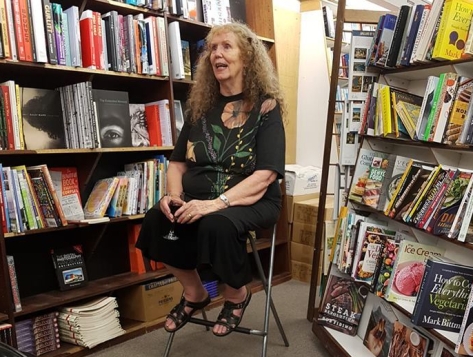
Reading at Novel Idea, Kingston. Photo by Andrew Simms.






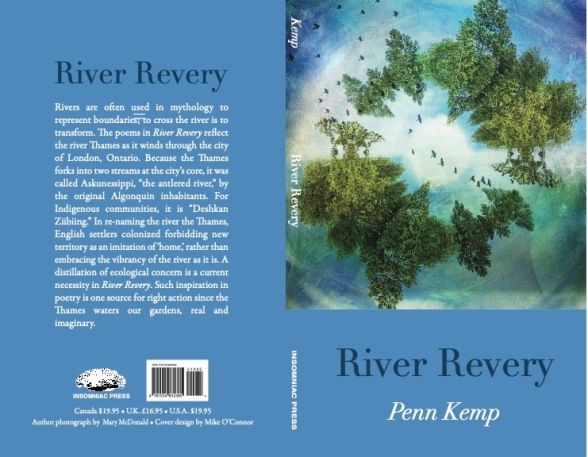
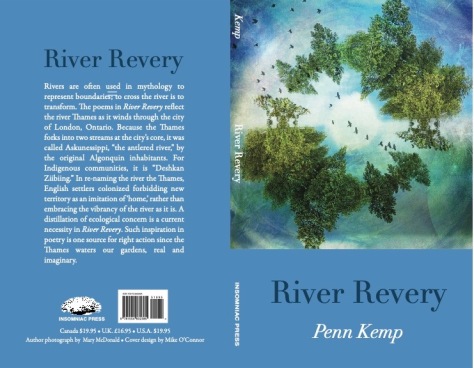
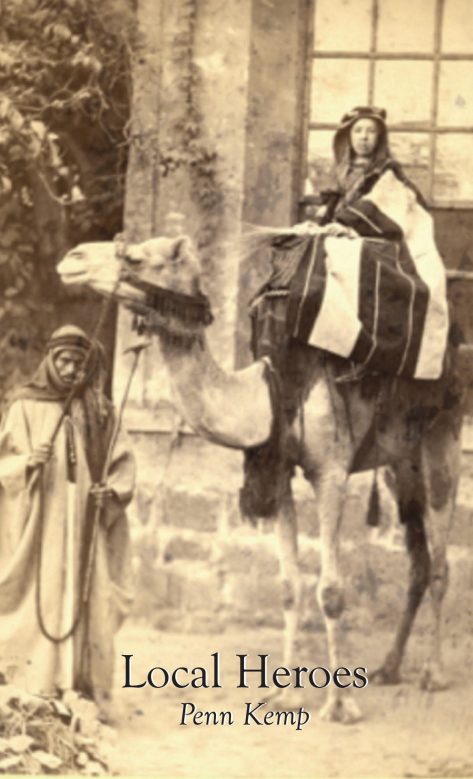
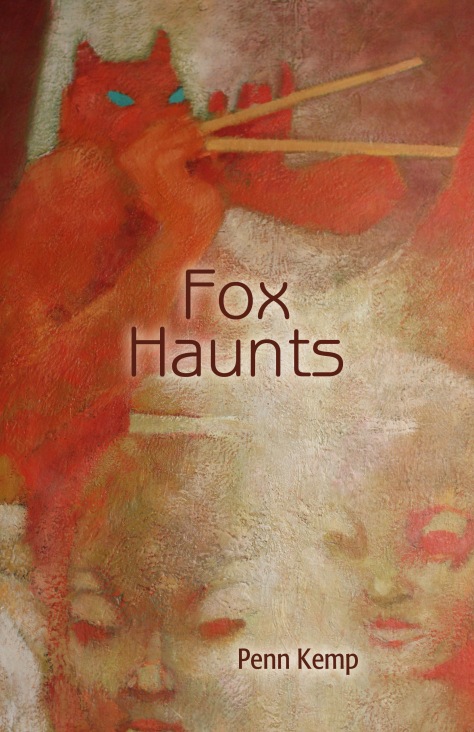
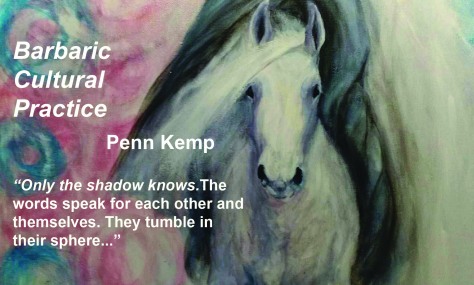
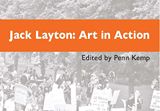
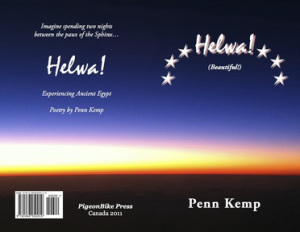

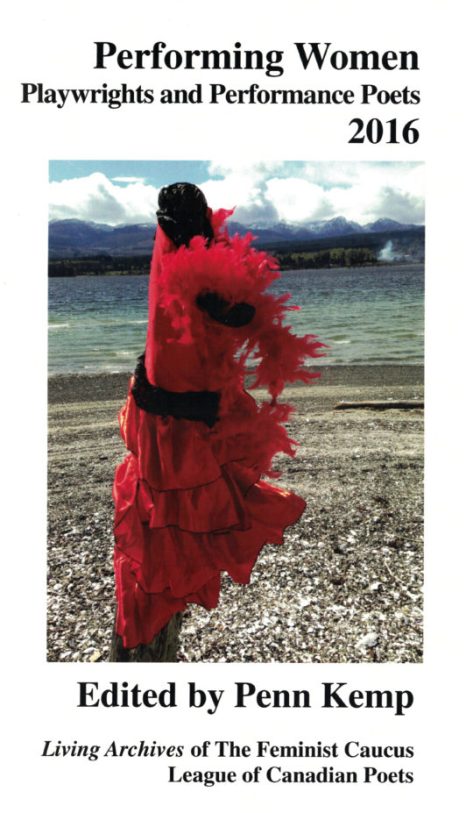



 With Nina Desjardins, Diana Beresford-Kroeger, me and my son Jake Chalmers at the book signing after our Wordsfest “In Conversation”! FUN! Thanks, everyone for filling the hall… and THANKS, Wordsfest! My reading from
With Nina Desjardins, Diana Beresford-Kroeger, me and my son Jake Chalmers at the book signing after our Wordsfest “In Conversation”! FUN! Thanks, everyone for filling the hall… and THANKS, Wordsfest! My reading from 
 Since our first production of Penn Kemp’s play in 1977, Pendas Productions has been developing multimedia works, often in collaboration with other artists and art forms. Our micro publishing company in London ON has produced plays, CDs, DVDs of sound opera, as well as hand-made art books of poetry, art and drama, often in combination with CDs. The company started in 1977 with the production and publication of Kemp’s first play, The Epic of Toad and Heron (Black Moss Press), a drama written to save Toronto Island homes. Pendas continued with poetry/cd combination books, featuring more than twenty authors and producing anthologies in several languages.
Since our first production of Penn Kemp’s play in 1977, Pendas Productions has been developing multimedia works, often in collaboration with other artists and art forms. Our micro publishing company in London ON has produced plays, CDs, DVDs of sound opera, as well as hand-made art books of poetry, art and drama, often in combination with CDs. The company started in 1977 with the production and publication of Kemp’s first play, The Epic of Toad and Heron (Black Moss Press), a drama written to save Toronto Island homes. Pendas continued with poetry/cd combination books, featuring more than twenty authors and producing anthologies in several languages.

